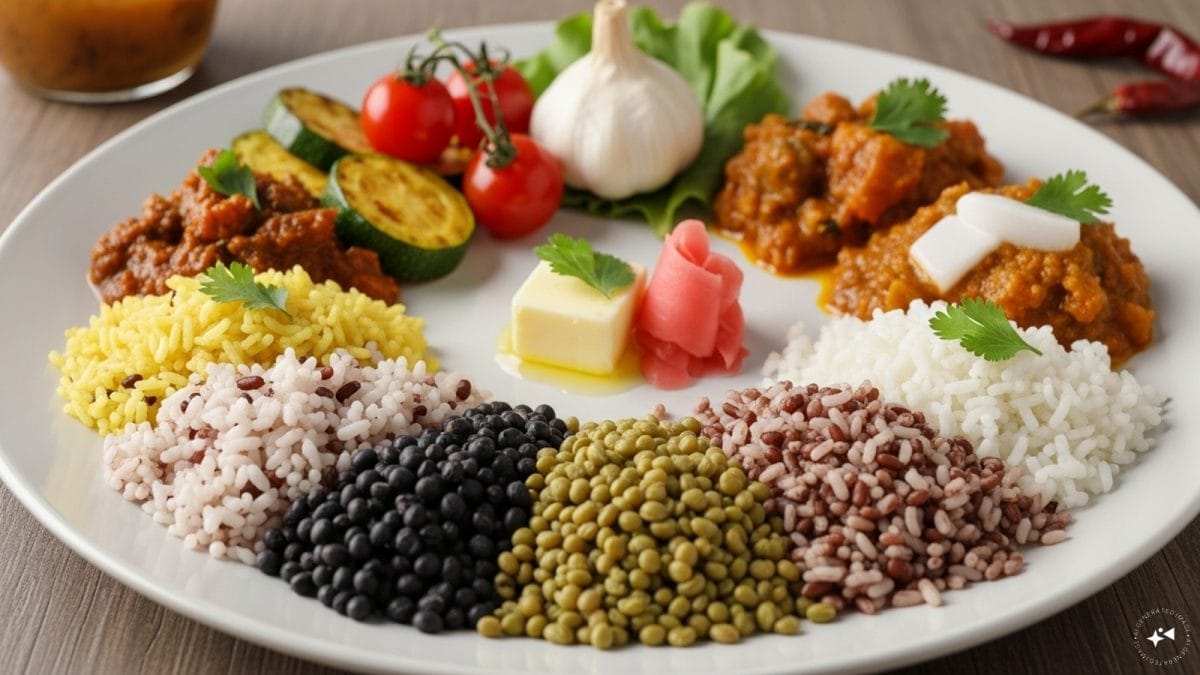Last Updated:
Ayurveda and modern medicine both agree that the monsoon calls for mindful eating, disciplined routines, and careful attention to our surroundings and emotions

Ayurveda recommends a balanced diet during seasonal shifts. (AI Generated Image)
When the rains bring much-needed relief from the summer heat, they also test our bodies. During this season, digestion slows, immunity dips, and joint pains can worsen. India’s ancient health system, Ayurveda, refers to this time as Varsha Ritu. It describes a period when the balance of doshas changes, making us more susceptible to illness.
Dr Somit Kumar, Director and Chief Scientific Officer, AVP Research Foundation shares all you need to know:
The Monsoon Effect on the Body
In Ayurveda, Vata dosha is associated with dryness and movement; it becomes increased during this season, leading to bloating, indigestion, and joint stiffness. Pitta dosha, linked to heat and metabolism, tends to build up, which can cause acidity, skin issues, and irritability. At the same time, Agni, the digestive fire weakens, slowing metabolism and lowering immunity.
Modern science supports these ideas. High humidity can disrupt digestion, disturb gut bacteria, and raise infection risks. People with arthritis often report worse joint pain due to changes in atmospheric pressure. Doctors also note a higher likelihood of waterborne and mosquito-borne diseases during this time. Clearly, the body’s defences weaken in the rain, making seasonal adjustments necessary, a practice known in Ayurveda as Ritucharya.
Food First: Diet for Varsha Ritu
Diet plays a crucial role in monsoon care. Ayurveda suggests foods with sour (Amla), salty (Lavana), and oily (Sneha) properties to help balance digestion. Easily digestible grains such as old rice, barley, and wheat are recommended. Warm soups, light meats, and spiced broths offer nourishment, while boiled or herbalized water with ginger, cumin, or coriander supports digestion and helps prevent infections.
Ayurveda-based Functional foods provide additional benefits. Whey, the clear liquid from yogurt, is full of proteins, minerals, and probiotics that support gut health and boost immunity. When combined with black salt (Kala Namak), which contains natural iron, potassium, and magnesium, it acts as a restorative digestive tonic. Honey mixed with cold water gives quick energy, supports good gut bacteria, and provides antioxidants that reduce inflammation.
The traditional Ayurvedic spice mixture Panchakola composed of Pippali, Pippalimoola, Chavya, Chitraka, and dry ginger stimulates appetite, boosts metabolism, detoxifies the gut, and reduces inflammation.
Doctors, both Ayurvedic and conventional, advise against stagnant water, raw leafy greens, excessive alcohol, heavy meats, and street food, as these can strain digestion and increase infection risks. The safest option is to enjoy fresh, warm, home-cooked meals seasoned with spices that boost immunity.
Lifestyle Practices for Monsoon Wellness
Seasonal or Ritucharya care extends beyond diet. Ayurvedic oil massages after a warm bath help balance raised Vata and prevent stiffness. Basti therapy (medicated enema) is suggested for balancing Vata and impacts the gut microbes in the Large intestine.
During Rainy season, habits to avoid include sleeping during the day, moderate exercise. excessive sexual activity, and getting soaked in the rain. Ayurveda advises against lingering in damp, windy places like riverbanks, as they can imbalance doshas. Epedemeological studies highlight that there is increase in fungal infections, mosquito-borne diseases like dengue and malaria during this times.
Kshemakutuhalam suggests wearing clothes in cool shades, while blue and green are believed to balance doshas and calm the mind. Research backs this claim, showing these colours can affect blood pressure and mood.Similarly, aromatic oils such as sandalwood, saffron, and agarwood have calming effects on the nervous system, improve sleep, and balance emotions. Studies in aromatherapy support their ability to reduce stress and enhance memory.
A Holistic Perspective
The rains represent more than just a seasonal change; they are also a biological challenge. Ayurveda and modern medicine both agree that the monsoon calls for mindful eating, disciplined routines, and careful attention to our surroundings and emotions. By following simple seasonal practices such as warming foods, protective habits, and calming influences, we can maintain our health, strengthen immunity, and embrace the rains with energy rather than vulnerability

Swati Chaturvedi, a seasoned media and journalism aficionado with over 10 years of expertise, is not just a storyteller; she’s a weaver of wit and wisdom in the digital landscape. As a key figure in News18 Engl…Read More
Swati Chaturvedi, a seasoned media and journalism aficionado with over 10 years of expertise, is not just a storyteller; she’s a weaver of wit and wisdom in the digital landscape. As a key figure in News18 Engl… Read More
September 05, 2025, 13:28 IST







